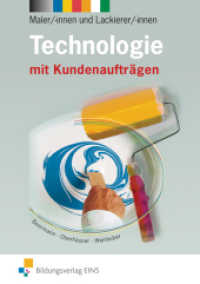Full Description
STEM project-based instruction is a pedagogical approach that is gaining popularity across the USA. However, there are very few teacher education programs that focus specifically on preparing graduates to teach in project-based environments. This book is focused on the UTeach program, a STEM teacher education model that is being implemented across the USA in 46 universities. Originally focused only on mathematics and science, many UTeach programs are now offering engineering and computer science licensure programs as well.
This book provides a forum to disseminate how different institutions have implemented the UTeach model in their local context. Topics discussed will include sustainability features of the model, and how program assessment, innovative instructional programming, classroom research and effectiveness research have contributed to its success. The objectives of the book are:
• To help educators gain insight into a teacher education organizational model focused on STEM and how and why it was developed
• To present the theoretical underpinnings of a STEM education model, i.e. deep learning, conceptual understanding
• To present innovative instructional programming in teacher education, i.e. projectbased instruction, functions and modeling, research methods
• To present research and practice in classroom and field implementation and future research recommendations
• To disseminate program assessments and improvement efforts
Contents
Preface; Joanne Goodell and Selma Koç.
Section I. The Uteach Model And Elements Of Success.
Chapter 1. The Development of the UTeach Model; Michael Marder.
Chapter 2. Implementing and Sustaining UTeach Programs: Lessons Learned from National Expansion; Pamela Romero and Kimberly K. Hughes.
Chapter 3. Derivatives of the Standard Model; Diane E. Bennett and Joanne E. Goodell.
Chapter 4. The UTeach Internship Program: Serving the Community and Promoting STEM Education; Shelly R. Rodriguez and Amy L. Moreland.
Chapter 5. Cross-Pollination in an Unusual Setting: The Success Story of UTeach Dallas; Mary L. Urquhart.
Chapter 6. Collaboration, Communication and Community: Transitioning from a Traditional Model; Jennifer M. Dechaine and Ian Loverro.
Chapter 7. The Many Facets of Induction Support; Kelli Allen.
Chapter 8. UTeach Maker: Preparing Future STEM Educators for Classroom-Based Making; Shelly R. Rodriguez, Jason Harron, and Hannah Smith Brooks.
Chapter 9. Laboratory Schools to Support the Preparation of UTeach Preservice Teachers; Michael Odell, Teresa Kennedy, Jo Ann Simmons, and Jaclyn Pedersen.
Chapter 10. Innovative Shared Master Teacher Model: The University of Maryland and a Local School District; Anisha Campbell, Steven Karig, Kayla White, and Julie Brenner.
Chapter 11. Aligning Field and Classroom Experiences for Secondary STEM Teacher Preparation; Kristen Apraiz, Gayle Nelson Evans, and Thomas Dana.
Section II. Innovative Instructional Programming.
Chapter 12. The UTeach Instructional Program, Elements, and Courses; Kimberly K. Hughes, Ashley R. Welch, and Amy L Moreland.
Chapter 13. STEM Teaching for Social Justice: Experiences in Early Fieldwork Courses; Anita Sanyal Tudela, Sarah Henson-Darko, Steve Karig, and Kayla White.
Chapter 14. Steps 1/2 Combo: Summer Field Experiences on Campus and in the Community; Rachelle Haroldson.
Chapter 15. Incorporating the Clinical Interview Method into the Knowing and Learning in Mathematics and Science Course; Selma Koç.
Chapter 16. Classroom Interactions: Course Overview and Description of an Innovative Co-Teaching Model; Patrick McGuire and Steve Ottmer.
Chapter 17. A Tale of Two PBI Classes; Katie Donaldson, Kate York, Robert Gagnon, and Cory Gavitt.
Chapter 18. The Evidence Behind the UTeach Capstone Course: Does Project-Based Learning Work? Dawn Woods and Candace Walkington.
Chapter 19. VCAST Learning Modules: A Functions & Modeling Course Innovation; Laurie O. Cavey, Jason Libberton, Tatia Totorica, Michele Carney, and Patrick R. Lowenthal.
Chapter 20. Benefits of Liberal Arts Curriculum in STEM Teacher Preparation; Gregory D. Gilson.
Section III. Research And Future Directions.
Chapter 21. Developing the UTOP: A Flexible STEM Observation Instrument Based on UTeach Principles; Candace Walkington, Michael Marder, and Elizabeth L. Adams.
Chapter 22. Developing an Assessment of Attentiveness for Program Evaluation; Leslie Atkins Elliott, Michele Carney, Sara Hagenah, and Tatia Totorica.
Chapter 23. Promoting Early Career Teacher Resilience Through a CalTeach Preparation Program; Doron Zinger, Therese Shanahan, and Kris Houston.
Chapter 24. Examining UTeach Graduates' Employment Choices: Outlining a Framework for Future Research; Michael Horvath, Vasilios D. Kosteas, and Joanne E. Goodell.
Chapter 25. How Do Intentions to Teach Relate to Recruitment and Retention of UTeach Program Candidates? Melissa Dodson, Whitney Cade, Feng Liu, and Michael Vaden-Kiernan.
Chapter 26. Computational Thinking for STEM Teacher Leadership Training at Louisiana State University; Fernando Alegre, Juana Moreno, Jerry S. Weltman, David Kirshner, John Arthur Underwood, Frank Neubrander, and James J. Madden.
Chapter 27. Incorporating Project-Based Learning into the Secondary Mathematics and Science Classroom: Is it Pie in the Sky? David M. Sparks and Debbie Jackson.
Chapter 28. Exploring the Effectiveness of FSU-Teach Graduates: An Analysis Through the Lens of Induction; Ellen Granger, Sherry A. Southerland, and Robin R. Smith.
Chapter 29. Examining Retention of UTeach Arlington Graduates in High Need Classrooms; Ann M. L. Cavallo, Gregory R. Hale, and Erin Gonzales.








